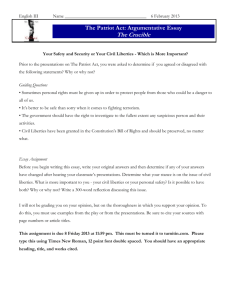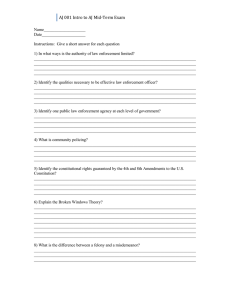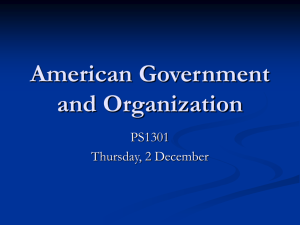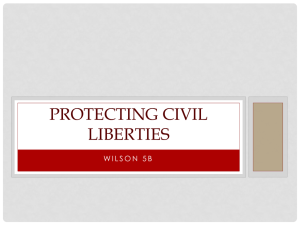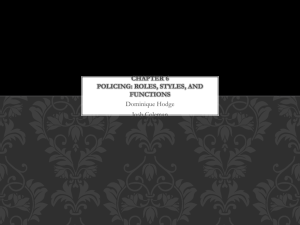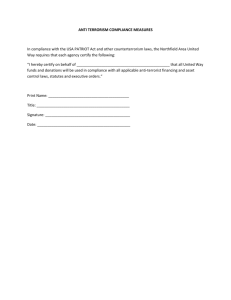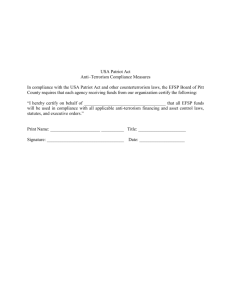Sociology in Our Times: The Essentials
advertisement
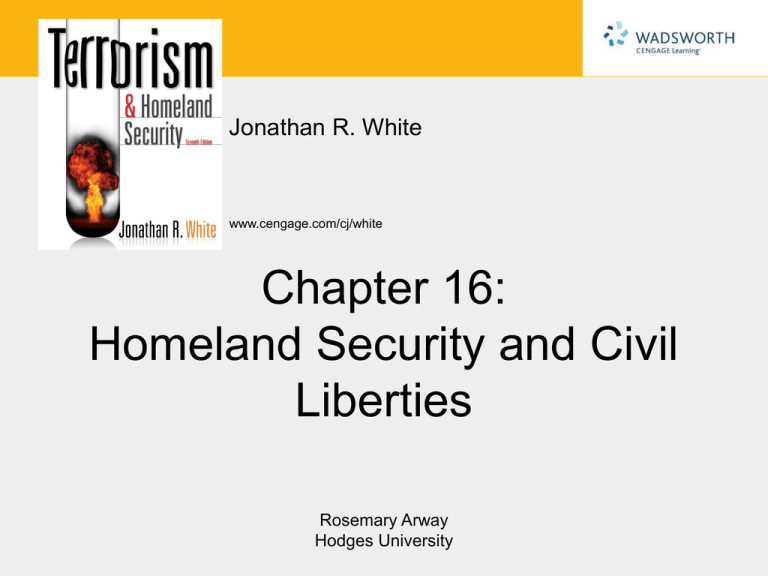
Jonathan R. White www.cengage.com/cj/white Chapter 16: Homeland Security and Civil Liberties Rosemary Arway Hodges University Security and Liberty There are always trade offs when considering security. The question of the suspension of liberty lies at the root of arguments concerning homeland security. o Open nature of democratic societies make the social structure open to attack. o Limiting civil liberties is far more dangerous than the more limited threats posed by terrorism. o Decreasing civil liberties limits individual freedom and increases government power. Human Rights and Civil Liberties Civil Liberties o Individual freedom people have under a system of law Two major approaches: o Favoring strong security at any cost overlooks human rights abuses and deemphasizes civil liberties o Favoring civil liberties deemphasizes security while emphasizing human rights Human Rights and Civil Liberties Human Rights o Focus on the legal right to exist in a society where people are free from arbitrary coercion. o Human rights intersect terrorism and homeland security in two areas: ▪ Terrorist attacks on innocent civilians violate the right of people to exist apart from political violence against innocent people. ▪ Governments countering terrorists must respect the human rights of their opponents. Defense in Depth Changes in how war is fought affect the structure of civil society. Terrorist fight against the way people live. o Combating terrorism involves preservation and protection of social order. To defend against terrorism a nation or culture must use civil defense. The idea of defense in depth implies that all levels of society must become involved in homeland security. o o Society fights for its existence; all members are committed to preserving a similar goal. Society may have to sacrifice the assumption of everyday live. Defense in Depth The United States of America, founded on the principles of democracy and individual freedom that have been developed in the West for the past thousand years, struggles with civil rights: o Defense in depth alters the balance by emphasizing state power. o Discussing Homeland Security always brings to attention topics of individual rights. o In order to be better prepared to secure homeland, Americans must engage in nationwide discussion of defense in depth and its impact on civil liberties before an attack. Civil Liberties and Federal Power The USA Patriot Act of 2001 o The most controversial aspect of counterterrorism. o Increases the ability of the government to collect information and increases executive power. ▪ Intelligence activities or information gathering symbolize the fears of critics. ▪ Supporters argue that a nation cannot fight terrorism without intelligence gathering. Civil Liberties and Federal Power Criminal justice and national security agencies gathering information about people and organizations are doing so as an extension of the government’s executive branch. The U.S. Constitution separates the power of the three branches of government. o Legislative (law makers) o Judicial (courts) o Executive (enforcement) Civil Liberties and Federal Power The U.S. Constitution’s most important parts: o The posse comitatus clause that forbids the use of military power to enforce civilian law. o Times of emergency clause allows certain necessary actions that would be prohibited if there is no state of emergency. Fourteen Amendment o Ensures that suspects cannot lose their rights except by due the process law. USA Patriot Act – 2001 Patriot Act o Has ten sections outlining new powers for government operations. Title I is designed to enhance domestic security. o Creates funding for counterterrorist activities, expands technical support for the FBI, expands electronic intelligence gathering, and defines presidential authority in response to terrorism. USA Patriot Act – 2001 Title II improves the government’s ability to gather electronic evidence. o Allows police officials expanded authority to monitor communications. o Allows intelligence and federal law enforcement agencies to share noncriminal information with each other. o Forces private corporations to share records and data with federal law enforcement. o Allows the FBI to seize material when it believes national security is jeopardized. Title II contains a sunset close. o Automatic ending of the provisions of the Patriot Act unless renewed. USA Patriot Act – 2001 Title III o Empowers federal law enforcement to interact with banking regulators. o Provides arrest power outside U.S. borders for terrorist financing and money laundering. Title IV o Increases border patrols and monitoring of foreigners within the U.S. Title VII o Focuses on police information sharing. specifically targeting a nationwide police investigative network known as the Regional Information Sharing System (RISS) USA Patriot Act – 2001 Supporters of the Patriot Act o Patriot Act will increase federal law enforcement’s ability to respond to terrorism. o Patriot Act will create an intelligence conduit among local, state, and federal police agencies. Opponents of the Patriot Act o Patriot Act goes too far in threatening civil liberties while expending police powers. Debate and the 2006 Law The Patriot Act was scheduled for renewal in 2005. U.S. Senate expressed some concern. o 2001 law passed too quickly. o Many of the provisions expanded government authority too far. o Reservations about making some of the information gathering practices permanent. Reasons for reservations centered on concerns about how the Patriot Act had been used by the government. Debate and the 2006 Law 2006 Congress and the White House reached a compromise o A request for information can be challenged in court. o Suspects may seek counsel from an attorney. o Added a provision requiring retailers to maintain information in sales of over-the-counter drugs that could be used to create methamphetamines. o Government still has the right to intercept communications. o Time suspects can be kept under surveillance was extended. Debate and the 2006 Law Laws that were renewed: o o o o o The government has the right to intercept communication. Criminal intelligence can be given to agencies charged with national security and the security community can openly communicate with the law enforcement community. The government has the right to extend the time suspects can be kept under surveillance and allows the government to seize electronic. The law requires internet and e-mail providers to hand over records. Federal law enforcement is allowed to collect national security intelligence if that is their “significant purpose.” Terrorism and the Constitution Constitutional Concerns o Cole & Dempsey They fear federal law enforcement power is growing too strong in a wave of national hysteria. Antiterrorism legislation empowers law enforcement agencies to enforce political law. If terrorists are prosecuted under criminal law, the Constitution will be preserved. Terrorism and the Constitution Cases that illustrate Cole and Dempsey’s thesis: o Late 1960s to early 1970s through COINTELPRO the FBI ran over the rights of suspects and citizens. o 1981 to 1990 the FBI overreacted against U.S. citizens sympathetic toward revolutionaries in El Salvador. o In the1990s Muslims and Palestinians were targeted without reasonable suspicion. o In the 1990s political investigations expanded against radical environmentalists and others. Terrorism and the Constitution Cole & Dempsey o Law enforcement should only gather intelligence when there is reason to suspect criminal activity. The Cole & Dempsey thesis is endorsed by: o o o o Jurists Self-appointed civil rights organizations Legal scholars Die-hard conservatives that support many of the Bush administration’s other efforts Terrorism and the Constitution Cole & Dempsey’s two critical arguments: o Bush and Cheney maintained that the president had the power to designate certain terrorists as “enemy combatants” and subject them to trial by special military courts. o Bush and Cheney also maintained that national security agencies’ interception of telephone calls originating in the U.S. directed to suspected terrorists in foreign countries was permissible through presidential authority. Issue about executive power form the crux of the debate about civil rights and security. Increased Executive Powers Katz o Actions taken to prevent another 9-11, o when reasonable, do not violate the 4th Amendment. o There is no blanket policy of reasonable, and care must be taken to balance security with civil liberties. ▪ However, eavesdropping on attorney-client conversations is a violation of the 6th Amendment Konotorovich o The U.S. must make all reasonable efforts to stop the next attack. o Tortures are out of the question but drugs are viable alternative. Increased Executive Powers Military tribunals that deny the presumption of innocence. Colb o The scope of September 11 calls assumptions about profiling into question. o Profiling will yield many more investigative inquiries than apprehensions. o One of the characteristics of terrorists in profiling is race. Department of Justice - in the effort of catching terrorists scrapped restrictions from the agents. o Centralized approval is no longer needed; local FBI offices empowered to launch inquires based on their own information and initiative. Increased Executive Powers New guidelines, executive orders, and military tribunals have created strange twists in the criminal justice system. Wedgwood o Terrorists are detained because no writ, no law, nor court order would stop them from attacking. o Terrorists must be physically restrained to keep them from returning to society. o There is irony between Americans being detained militarily and foreigners being held under civilian arrest. o Going to trial means exposing intelligence sources for the sake of a criminal conviction. o Wedgwood suggests terrorists could be given a military hearing to determine whether or not they continue to represent a threat. Limiting Executive Powers Herman o Believes the Patriot Act to be a law throwing the balance of powers out of kilter. o Congress relinquished its power to the president. o Congress also failed to provide any room for judicial review. o Patriot act concentrates too much power in the executive branch. By increasing executive powers, the constitution is threatened “War on terrorism” translates to a “war on the balance of powers.” o 1968 Crime Control and Safe Street Act o 1978 Foreign Intelligence Surveillance Act (FISA) The America Civil Liberties Union (ACLU) ACLU o Charges the attorney general with trying to ‘gut’ immigration courts. o States that after September 11 the attorney general ordered to detain several hundred immigrants. ▪ Attorney General Ashcroft sought to have the rules for detaining and deporting immigrants streamlined. o States that tightening immigration laws is smoke screen for increasing executive powers at the expense of individual rights. ▪ Argument that attorney general will relay on the political issues rather than the rules of evidence when deciding which cases to prosecute. Executive Power and the Courts The courts review of some of the issues involved in counterterrorism. o o o Civilian and military courts have handed down decisions blocking the government’s authority to establish special military courts. Supreme Court ruled that Guantanamo detainees could contest the charges against them. Supreme Court also ruled that military tribunal systems established for enemy combatants was illegal. Courts have been increasingly limiting executive power. o o President acted without specific congressional authority. Courts are demonstrating that any effort to fight terrorism will be done so within the rule of law. Civil Liberties and Police Work An internal audit of the FBI practices found it violated its own rules or federal laws in national security investigations over 1000 times since 2002. o Information from e-mails and Internet providers o Agents did not understand their authority in national security investigations How police officers handle their responsibilities has a direct relationship to whether civil liberties are protected or abused. Civil Liberties and Police Work Controversies in Law Enforcement The Patriot Act was designed to facilitate intelligence gathering and to ensure intelligence sharing. o o o o o o The problems arise when the federal government requests assistance from state and local government. The police may be used in homeland security. The criminal justice system collects criminal intelligence, not information regarding homeland security. Terrorism moves the police into a new intelligence realm. To gather counterterrorist intelligence, the police are forced to collect political information. Any move to include police in an intelligence gathering system alters the expectations local communities have about law enforcement. National Security and Crime Two general schools of thought about police role in intelligence gathering. Proponents: o “Eyes and ears” - state and local law enforcement should be used as extension America’s intelligence agencies o Police should collect information and forward it to the appropriate intelligence unit Opponents: o Traditional crime response and prevention o Involvement of local law enforcement in intelligence gathering will interfere with the traditional police mission of crime fighting o Additional fears of expanded police powers Intelligence, Networks, and Roles All levels of law enforcement form nodes in a network opposed to terrorism. o Networks encourage the flow of information. o Agencies need to act in conjunction with each other. o The civil liberties danger appears when agencies inside a network either act illegally or forget their role. Law enforcement’s primary role in preventing terrorism is information gathering and sharing. o Sharing information neither poses a threat to civil liberties nor reduces the effectiveness of partnership. o Shared information enhances crime prevention and decreases fear inside a community. Intelligence, Networks, and Roles Jenkins, Cilluffo, Marayati o Present terrorism as a social idea without militarizing the problem. o They equate terrorism to child abuse, illegal drug use, gangs, drunk driving and family fights. ▪ Law enforcement became involved in education, intervention, information gathering, and enforcement in each of these areas, and they played their role without violating civil rights. o Terrorism represents a tactical change in conflict. o Deeper community relationships will enhance law enforcement’s role in national security by preventing crime, reducing fear, solving problems, and increasing the flow of information. Militarization and Police Work Law Enforcement o There are roles for law enforcement in homeland security, but there are questions about the necessity of developing these functions along military lines. Militarization o Refers to a process in which individual police units or entire agencies approach specific problems with military values and attitudes. o Military forces are necessary for national defense and they are organized along principles of rigid role structures, hierarchies, and discipline. Militarization and Police Work The IACP, America’s largest association of state and local police executives, has traditionally favored the civil role of policing over a militaristic approach. Florida’s Metro-Dade Police Department o Field Force technique – response to a growing disorderly crowd ▪ ▪ ▪ ▪ ▪ Massive show of organized police force Officers assemble in an area away from the violent gathering Isolate the area Provide a route for the crowd to disperse Overwhelm the crowd with military riot tactics Militarization and Police Work Police tactical units o Deal with barricaded gunmen, hostage situations, and some forms of terrorism o Use military weapons, small-unit tactics, and recognized military small unit command structures Kraska – law enforcement in the U.S. has gradually assumed a more military posture since violent standoff with domestic extremists. o Fears terrorism will lead to a further excuse to militarize Most terrorism analysts believe terrorism is best left to police whenever possible.
